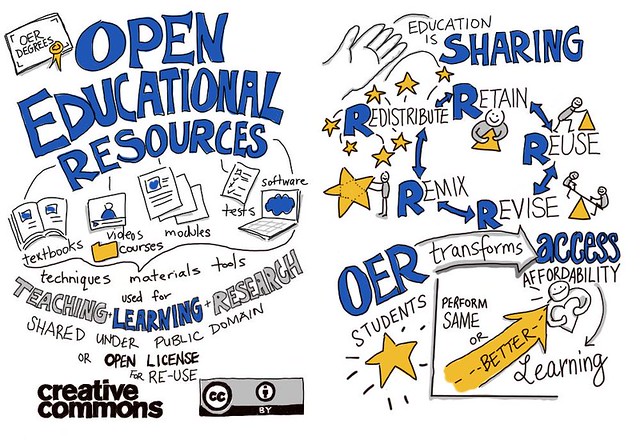The term Open Educational Resources (OER) was coined at UNESCO’s 2002 Forum on Open Courseware and designates “teaching, learning and research materials in any medium, digital or otherwise, that reside in the public domain or have been released under an open license that permits no-cost access, use, adaptation and redistribution by others with no or limited restrictions. Open licensing is built within the existing framework of intellectual property rights as defined by relevant international conventions and respects the authorship of the work”. In other words, Open Educational Resources are resources and tools, which are freely accessible and openly licensed that are useful for the teaching and learning, as well as researching. These resources can be beneficial for learners of foreign languages as they have free access to high-quality material.
The webpage opencontents.org defines the terms “open content” and “Open Educational Resources” and explains that they describe any copyrightable work (traditionally excluding software, which is described by other terms like «open source») that is either (1) in the public domain or (2) licensed in a manner that provides everyone with free and perpetual permission to engage in the 5R activities:
- Retain – make, own, and control a copy of the resource. For example, download and keep your own copy.
- Revise – edit, adapt, and modify your copy of the resource. For instance, translate into another language.
- Remix – combine your original or revised copy of the resource with other existing material to create something new. For example, make a mashup.
- Reuse – use your original, revised, or remixed copy of the resource publicly. For instance, on a website, in a presentation, in a class.
- Redistribute – share copies of your original, revised, or remixed copy of the resource with others. For example, post a copy online or give one to a friend.

There are many OERs, such as coursera or futurelearn. By completing these courses, students will improve a lot their vocabulary in the second language as well as their general knowledge about a great variety of topics.
OERs are great for learning vocabulary, but also to develop the four language skills. Have you ever used this free resources in your classes? Let us know what you think about these resources in the comments!
Happy learning!